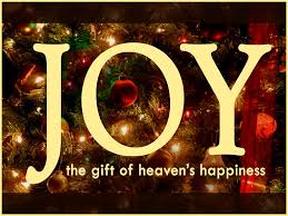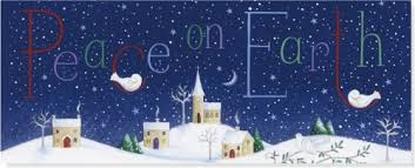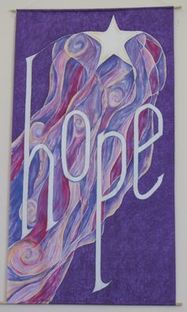
A long time ago, there ruled in Persia a wise and good king. He loved his people. He wanted to know how they lived. He wanted to know about their hardships. Often, he dressed in the clothes of a working man or a beggar, and went to the homes of the poor. No one whom he visited thought that he was their ruler. One time he visited a very poor man who lived in a cellar. He ate the coarse food the poor man ate. He spoke cheerful, kind words to him. Then he left. Later he visited the poor man again and disclosed his identity by saying, “I am your king!” The king thought the man would surely ask for some gift or favor, but he didn’t. Instead he said, “You left your palace and your glory to visit me in this dark, dreary place. You ate the course food I ate. You brought gladness to my heart! To others you have given your rich gifts. To me you have given yourself!”
This story of the wise and good king echoes another familiar story. Doesn’t it? It reflects the story we are reading today about another good and wise heavenly King who loves his people. A king who sheds all glory in order to find the most intimate, the most loving way to connect to and save the created. Us.
The stories surrounding the birth of Jesus teach us about the power and nature of love. The word “love” is not contained in any of the passages we read today about Jesus’ birth. Yet the fingerprints of love blanket all the scriptures we hear today. We experience love as Almighty, the greatest power in the universe, who takes on the frailty and vulnerability of a baby. We experience love as the limitless One who acquires the limitations of incarnation of a certain historical era, adapts to a particular gender, to a body shape and skin tone, eye color and language of a first century, middle-eastern Jew. We encounter love in Emmanuel, God-with-us, Jesus, who carves a life-path filled with teaching, healing, eating and drinking, walking dusty roads, confronting evil and sin, all for us.
Our stories today underscore insights about love for us to contemplate. We perceive how God invites Mary to be Jesus’ mother – Love doesn’t demand or force its way on another. Love invites. Mary in turn in gives her confident response, “be it done to me according to your will.” A teenager, on the cusp of womanhood, trusts and turns risk-taker for Love. She faces ostracization, even death, for this great leap of love. We see love working in Joseph, Mary’s betrothed. Joseph is initially perturbed by her pregnancy – for he is not the father. Joseph, because of love, despite his sense of betrayal, doesn’t seek to humiliate Mary or see harm come her way. He seeks to divorce her quietly. Love seeks to protect, not harm. Because of Joseph’s kindness, Love reaches Joseph through his dreams, and he obeys. He takes Mary as his wife, saving her and the unborn Jesus. Love can seem irrational, improbable, contradictory, but in the end, it is an invitation to enter the unknown. Mary and Joseph share this holy conundrum together – and today with us.
As we observe in our story, love doesn’t mean life will be cushy. Mary and Joseph experience the hardship of traveling to Bethlehem in the last month of pregnancy. They end up in a stable because there is no room in the inn – unthinkable in a culture that valued hospitality. This divine baby is born without the comfort of home and extended kin. He is born without even comfortable surroundings of the local inn. Love chooses what most consider an indignity – in a stable with first witnesses as animals, and a feeding trough for a bed. Smelly shepherds, considered unclean and kept at arm’s length in ancient Israel, are the first guests to answer the angels’ song. Next foreigners, suspicious gentiles from the East, who have sacrificed months of travel, are the next recorded guests. Finally, if all this weren’t enough upheaval, this small family ends up fleeing to Egypt. They are made refugees because of the death-threats of King Herod. Love chooses hardship, love chooses the unchosen, because that is love’s nature, to lift up the broken and rejected.
This is not the kind of love story we are used to. We are used to centuries of sanitized readings of our lessons today, so sentimentalized we often lose the edginess of each verse of the original text. Love risks. Love sacrifices. Love suffers. Love takes leaps of faith. Love doesn’t care what others think. Loves seeks the unloved, the discarded, the lost, those pushed aside.
God’s love turns human conventions on its head. Instead of condemning the poor as dregs of the earth, Love seeks to dine with them. Instead of looking out for its own, Love stretches itself utterly to embrace the needs of others. This is the journey love takes: this is the journey Mary and Joseph, and Jesus takes. Love is not a commodity to be hoarded. Love doesn’t play it safe. As the saying goes, Love isn’t love until it is given away. The miracle is the more we give away, the more we have.
Christmas would have us love like a king: A king-child who reminds us:
Most kings are usually born in a palace, but this king was born in a stable.
While most kings spent all their time building up riches of gold, silver and jewels, this king owned nothing at all.
While most kings surrounded themselves with servants, he chose to be a servant.
Jesus hung out with a bunch of smelly fishermen, tax-collectors the poor and sinners, instead of the aristocracy
They put a crown made of thorns on this head, they poked him with sharp sticks and made fun of Him.
No, instead of being the Backward King, He is the Forever King
Instead of robes and jewels he wore a cloak and tunic.
He was powerful but also powerless
Instead of using great armies and weapons, his only weapon was love
As we finish our lessons this morning, let our hearts reawaken to the love inked in every line. We, so loved, are chosen, we are chosen -- by God to continue the story of the Good and wise King. Of our savior-child-King. For once upon a time, perhaps a day like today, an angel asks, and a savior is born in the feeding trough of our hearts. And the miracle will be that we become God’s love letter written to the world in our actions, through the very words we chose to speak. Let the sacred story of the good and wise savior-king continue in us this Christmas Eve.
A blessed, love-filled Christmas to all!




 RSS Feed
RSS Feed